'Human Trafficker' Hanged By Iranian Authorities

A man has been executed in Iran for leading a human trafficking and prostitution ring, according to state officials.

A man has been executed in Iran for leading a human trafficking and prostitution ring, according to state officials.
The judiciary's Mizan Online news website said that Shahrouz Sokhanvari was hanged Saturday morning after his sentence was confirmed in the supreme court.
The report said that Sokhanvari was charged with "corruption on earth" for "establishing and managing a wide network of prostitution at the international level that has been attracting Iranian and foreign girls".
Sokhanvari left Iran in 1983, living in India, Malaysia, the United Arab Emirates, Ukraine, and the US before authorities captured him overseas and returned him to Iran in 2020, according to Mizan.
The report did not mention the country of detention or the process that led to his arrest.
The execution of Sokhanvari came a day after three men were hanged for killing three members of the security forces at a demonstration in Isfahan on November 16.
Human rights organizations based outside Iran strongly condemned both Friday's executions and the earlier trials that led to the convictions of the three men without any reliable evidence against them.
According to the Oslo-based Iran Human Rights, more than 220 people have been executed in Iran since the beginning of the year.
Human rights organizations, including Amnesty International, claim that the country executes more people every year than any other nation with the exception of China.
This year has seen at least 582 executions in Iran, the highest number since 2015, according to the two groups.
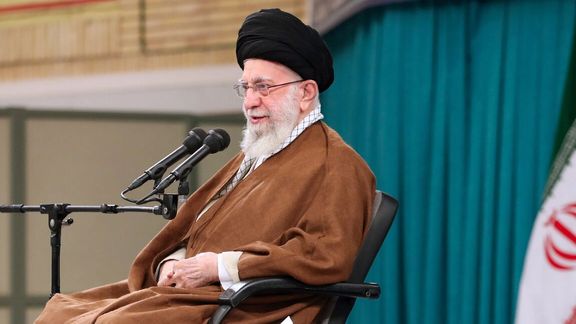
An “honorable” foreign policy that rejects supplication should be the guide for Iran’s diplomats, Supreme Leader Ali Khamenei said in a speech on Saturday.
Khamenei addressed foreign ministry officials and ambassadors at a time when his foreign policy of defying the West has become more controversial in Iran amid a serious economic crisis.
Khamenei set out to explain and clarify the principles and standards of “a successful foreign policy” focusing on three keywords: Honor, wisdom, and expediency.
A foreign policy based on supplication in words or in essence, and begging for favors from foreign powers is doomed, Khamenei said. He urged diplomats to respond to the words and actions of others reciprocally and “with honor.”
The 83-year-old authoritarian ruler also emphasized the need for wisdom in foreign policy. In a statement urging caution, he said that “uncalculated and dismissive” decisions and actions in the past have harmed the country.
Iranian officials and politicians, however, usually take their cue from Khamenei, especially in foreign policy matters. His past statements against regional countries such as Saudi Arabia, Israel, or the United States and Europe have led to more provocative statements by his underlings.
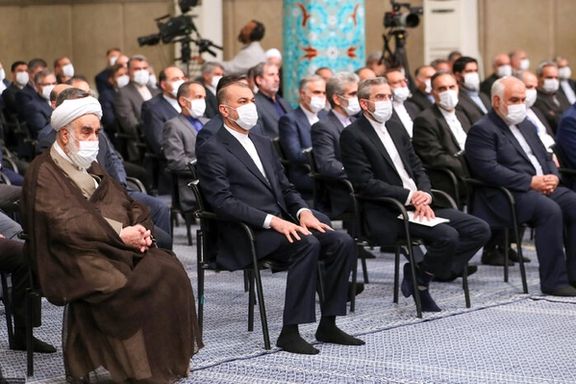
But the Supreme Leader often speaks with double meanings, leaving room for himself to shirk responsibility if a certain policy proves to be a failure.
Khamenei used this tactic during nuclear negotiations a decade ago. While approving the policy of talks and compromise, he also warned that other nations could not be trusted, and a nuclear deal might prove to be disadvantageous.
He followed the same tact on Saturday, saying that the principle of using ‘wisdom’ also means not to unnecessarily trust what other countries say, although sometimes they are sincere. He has repeatedly said in the past that the United States and its allies cannot be trusted.
Khamenei in his speech used the Islamic concept of 'Taqiyya' to describe the regime's decision to accept the 2015 JCPOA nuclear deal with the West. Taqiyya means the permissibility to deny or conceal one's real beliefs to secure a worthy goal.
Khamenei’s emphasis on “expediency” as the third principle in foreign policy was particularly notable, as he urged flexibility “in necessary instances” and circumventing “tough barriers” to continue a set course.
His mention of ‘flexibility’ was a reference to his famous phrase of “heroic flexibility” in 2013, when he signaled his permission for nuclear talks to begin.
“Of course, a few years ago when ‘heroic flexibility’ was mentioned, some abroad and in Iran had the wrong take on it. Expediency means finding ways to circumvent difficult obstacles and pursuing the same path,” Khamenei clarified.
In the context of Iran's nuclear program, this remark could mean that Khamenei justifies negotiations as a way of continuing to pursue the same goal by going around the opposition of other countries.
Commentators and many politicians in Iran have been increasingly calling for a flexible foreign policy and accommodation with the West, while the public knows that Khamenei makes all the key decisions.
With annual inflation reported to be near 70 percent and the Iranian currency losing half its value in the past year, with popular anti-regime protests and labor strikes, Khamenei finds himself in a tough position. However, so far, there is no indications of a foreign policy shift, except an agreement to restore diplomatic ties with regional rival Saudi Arabia.
Khamenei in his speech urged his foreign policy establishment to work hard for improving ties with regional countries, blaming “the enemy for doing everything” to drive a wedge between Iran and its neighbors.
In Khamenei’s lexicon, ‘the enemy’ refers mainly to the United States and Israel and to a lesser extent to other US allies, including European powers.
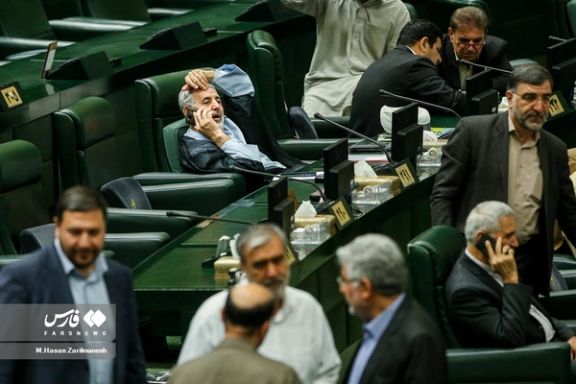
A prominent politician in Iran says none of the country's political factions can do anything to ensure a high turnout in the upcoming parliamentary election.
Mohammad Ali Abtahi, former reformist President Mohammad Khatami's chief of staff told Rouydad24 website on Wednesday that "if the people do not feel that it is a free election, they will not take part in it."
"My understanding is that the Guardian Council is not going to soften its policy on the disqualification [of reform-minded candidates]. It is not likely that those who have gone out of their way to create a unified political system will come short of their hardliner policies."
Other Iranian media outlets such as Khabar Online have also pointed out during recent days that ten months before the vote in March 2024, there is no election mood in Iran unlike previous rounds when campaigns started at least a year before the elections. In the meantime, many Iranian officials including Supreme Leader Ali Khamenei have expressed concern about a likely low-turnout next March.
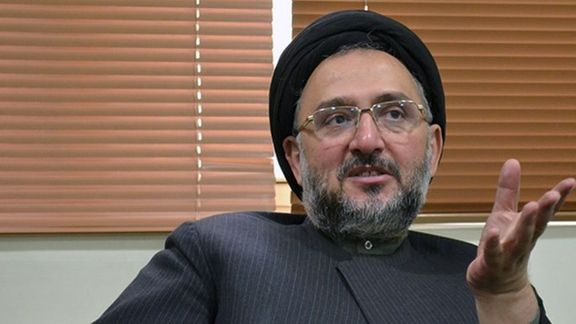
Khamenei told Iranian officials in late March that a high-turnout election will make the country powerful and will stop international pressures on the Islamic Republic. He called for a "healthy election" as he was aware of criticisms of the way the latest Iranian elections were held in 2020 and 2021 presumably under his supervision.
Many politicians, particularly reformist figures such as Abtahi and Mohsen Mirdamadi, the leader of banned reformist party Mosharekat have said that the regime in Iran has lost its social capital, a polite word for legitimacy, as a result of the disputed presidential election of 2009 and the protests that have rocked Iran since 2017.
Abtahi added that those who currently hold the power in Iran are not interested in increasing the turnout in the upcoming elections, as only a low turnout can ensure their victory.
Meanwhile, lawmaker Gholamreza Nouri Ghezeljeh told Khabar Online website on Wednesday that the current ultraconservative-dominated parliament is working hard in extraordinary sessions to pass an amendment to Iran's Election Law to serve the hardliners by giving even more power to the conservative-dominated Guardian Council to disqualify any candidate who does not belong to the ultraconservative camp.
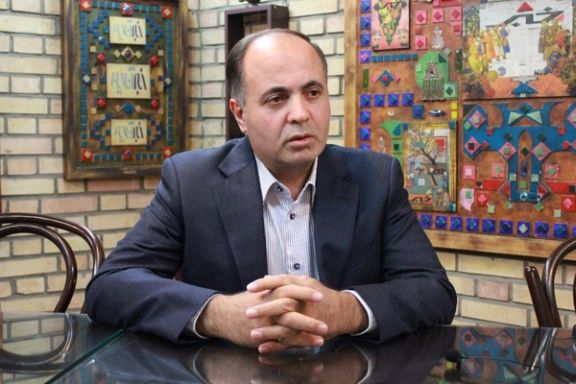
Ghezeljeh characterized the new legislation as "a law against the republican system," however, he said that hardliners are working hard to enact the legislation before the upcoming elections.
On Tuesday, prominent conservative politician Mohammad Javad Bahonar had said that the Majles should not be involved in changing the Election Law, as the incumbent lawmakers tend to manipulate the legislation to ensure their own re-election.
Ghezeljeh said that in the draft amendment the Guardian Council has been given the power to disqualify even those who get elected. He said such a legislation will weaken the parliament altogether.
Some Iranian politicians have also expressed concern about the next presidential election which usually takes place in the year after the Majles election.
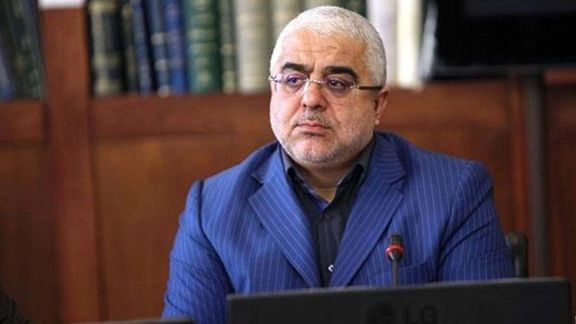
Former lawmaker Gholam AIi Jafarzadeh Imenabadi said in an interview on Wednesday that President Ebrahim Raisi's chances for re-election is limited. "He can score only if they put him in front of an empty goal post," he said.
Imanabadi reiterated that "In a competitive election neither Raisi nor 90 percent of current lawmakers have any chance to get re-elected."
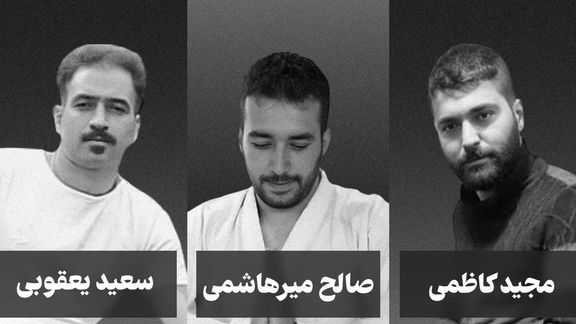
The Iranian regime’s execution of three protesters, despite numerous global pleas, has outraged Western governments and people around the world.
The Islamic Republic executed Majid Kazemi, Saeed Yaghoubi and Saleh Mirhashemi on Friday morning over trumped up charges after extracting forced confessions, in a case described as a travesty of justice. Human rights campaigners say they were tortured into confessions, and there was no reliable evidence against them.
Friday's executions brought to at least seven the number of protesters hanged since the beginning of the nationwide protests last September, which turned into one of the boldest challenges to the clerical rulers since the 1979 revolution.
The protests were ignited by Mahsa Amini's death in the custody of Iran's morality police.
In anticipation of their imminent execution, the three men on Wednesday appealed in a handwritten note for public support, saying, "Don't let them kill us".
"We need your help," said the note that went viral on social media, drawing local and international appeals to halt the executions, including from Washington.
Iranians are outraged and frustrated over the hangings; frustrated that their protest rallies outside the prison where they were held failed to halt the executions and outraged that calls by the international community did not stop the Islamic Republic from hanging people who protested against its injustice.
People in numerous neighborhoods in the capital Tehran as well as Esfahan (Isfahan) and several other cities across Iran poured out into the streets, chanting slogans against the regime and calling for its downfall.
In Tehran’s neighborhoods of Sattar Khan, Tehran Pars, Ekbatan and several others, as well as numerous neighborhoods in Esfahan and Kurdish majority cities of Mahabad and many others protests took place. There are unconfirmed reports of security forces clashing with the protesters.
Leading Iranian opposition figure exiled prince Reza Pahlavi said, “Despite the brave protests of our compatriots, the Islamic Republic has hanged three young protesters in Esfahan.”
“This murderous regime is emboldened by the West’s inaction. Those nations that claim to stand for human rights must recall their ambassadors from Tehran immediately. Iranian lives matter.”
Condemning the executions, a US State Department spokesperson said that Washington joins the Iranian people and their families in mourning the deaths of these three men.
“As we have said, it is clear from this episode that the regime has learned nothing from the protests that began in September of last year. It is no wonder so many young people in Iran are calling for change or leaving the country in droves.”
The US once again urged Iran's leadership to stop the killing, stop the sham trials, and respect people’s human rights, said the spokesperson, adding, “Sadly, we have no expectation that they will do so.”
"That is why we are continuing to work in close coordination with our allies and partners around the world to condemn and confront these appalling human rights abuses.”
Several protest gatherings were held outside the Islamic Republic’s embassies across the globe, including in Australia and Germany.
Alireza Akhondi, Swedish-Iranian member of the Swedish parliament, said that the Islamic Republic executed an average of two people per day in 2023. "But our response to these criminal monsters is persistence and courage to continue the struggle to achieve freedom." he added.
Centrist academic Sadegh Zibakalam in Tehran said Friday that “If they had not been executed, I don't think anyone would have attributed it to the system's weakness and fear of the opposition,” adding that “On the contrary, many people would consider it the regime’s respect and attention to public opinion.”
Also on Friday, the European Union condemned the hangings “in the strongest possible terms."
“The EU urges the Iranian authorities to refrain from applying the death penalty and carrying out future executions,” EU foreign policy chief Josep Borrell’s office said in a statement.
Opposition activists say the death penalty was used against the three men as an intimidation tactic to stop further protests. Iranian expatriate communities called for demonstrations against the executions in cities worldwide on Saturday, May 20.
Nazanin Boniadi, a British actor and activist of Iranian origin, tweeted that the three men had been executed “after forced confessions and sham trials.”
So far, around 500 civilians have been killed by security forces and at least 20,000 arrested. While many have been released, around 1,500 face criminal charges, and at least 80 detainees face the death sentence.
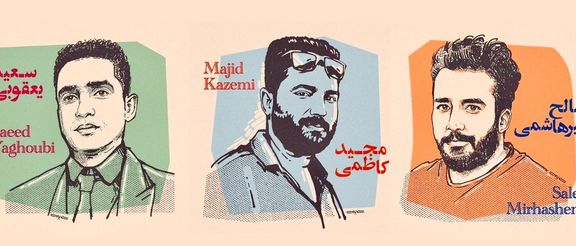
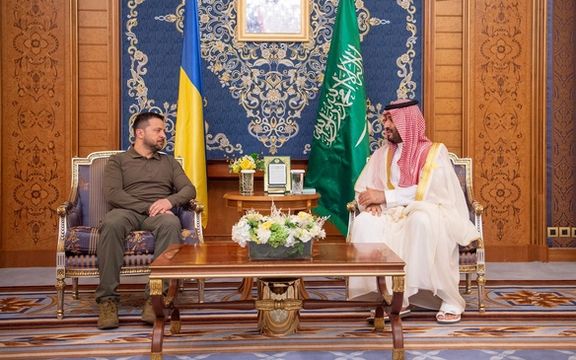
Saudi Arabia was the center of regional and world attention on Friday, as it invited both the Syrian and Ukrainian presidents to the Arab summit it was hosting.
In an unexpected move, Volodymyr Zelenskyy attended the summit of the Arab League to canvas support for his people, while Saudi Crown Prince Mohammed bin Salman expressed his readiness to mediate in the war between Moscow and Kyiv.
"We reaffirm the kingdom's readiness to continue mediating efforts between Russia and Ukraine, and to support all international efforts aimed at resolving the crisis politically in a way that contributes to achieving security," the Saudi Crown Prince said in his opening speech.
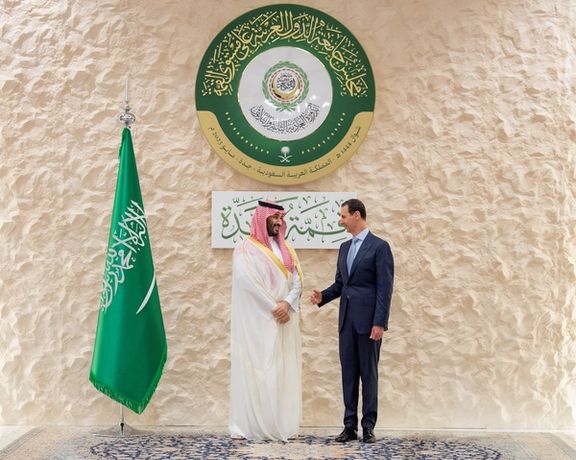
At the same time, Syrian President Bashar al-Assad was given a warm welcome at the summit, winning a hug from Saudi Arabia's Crown Prince at a meeting of leaders who had shunned him for years, in a policy shift opposed by the US and other Western powers.
However, having Assad, a Russian and Iranian ally and Zelenskyy at the same summit was a diplomatic achievement by Saudi Arabia that reinforces it image as the main player in the Middle East and increasingly a key presence on the world stage.
The government in Tehran has so far not reacted to Riyadh’s move inviting Zelenskyy to the summit, although there was negative coverage by IRGC-linked Fars news agency.
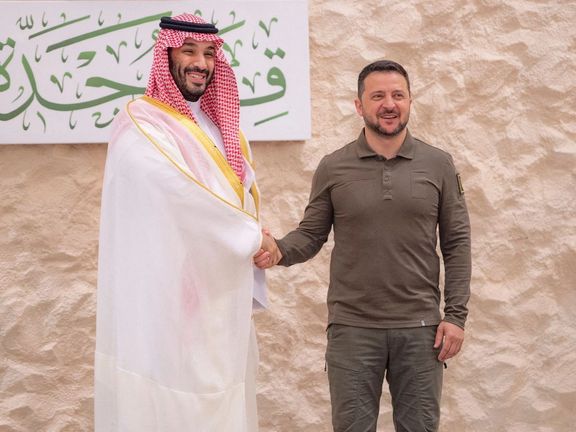
Iran has supported Russia’s invasion of Ukraine by supplying kamikaze drones and other weapons to Moscow and signing several economic agreements with Moscow just this week.
Although Tehran initially welcomed Saudi Arabia’s decision to restore ties with Assad, Iranian media began mentioning that Damascus owes tens of billions of dollars to Iran for its economic and military support since the start of the Syrian civil war in 2011. If rich Arab countries, led by Saudi Arabia, succeed in winning over Assad, Iran will be the biggest loser, finding its decade-long effort to expand influence in the Levant as a failure.
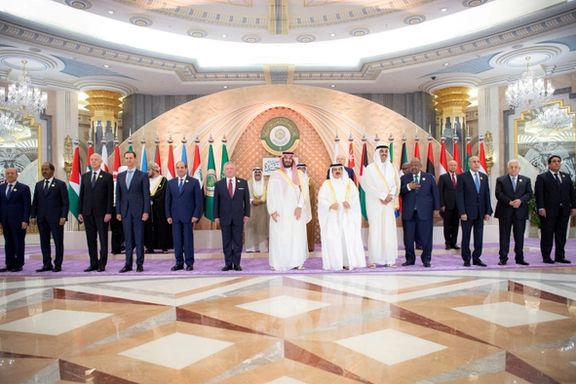
"We hope Syria's return to the Arab League leads to the end of its crisis," Crown Prince Mohammed said in his remarks, 12 years after Arab states suspended Syria as the country descended into a civil war that has killed more than 350,000 people.
Oil powerhouse Saudi Arabia, once heavily influenced by the United States, has taken the diplomatic lead in the Arab world in the past year, re-establishing ties with Iran, welcoming Syria back to the fold, and mediating in the Sudan conflict.
Washington has objected to any steps towards normalization with Assad, saying there must first be progress towards a political solution to the conflict.
"The Americans are dismayed. We (Persian Gulf states) are people living in this region, we're trying to solve our problems as much as we can with the tools available to us in our hands," an Arab source close to government circles told Reuters.
The Saudi Syrian rapprochement followed a Chinese-brokered deal between Riyadh and Tehran in March to restore relations after a seven-year hiatus.
In 2018, the Qatari emir said the region could not tolerate "a war criminal" like Assad. Qatar hosted an Arab summit a decade ago at which the Syrian opposition sat in Syria's seat. Many regarded Assad as a war criminal for bombing and gassing his own people during the civil war.
With reporting by Reuters
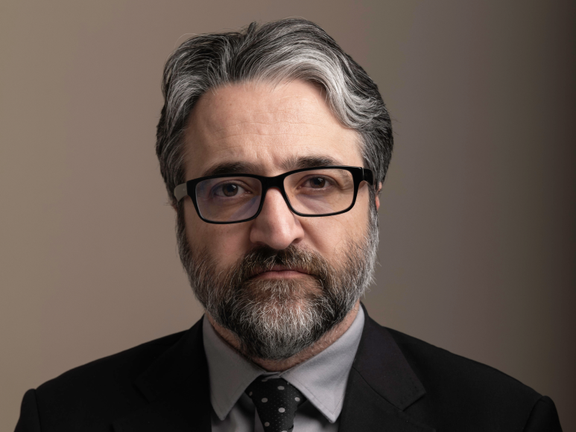
Opposition activist Hamed Esmaeilion has accused Iran of resorting to mass executions whenever it faces a threat.
But speaking to Iran International radio on Thursday, he warned the Islamic Republic regime that this time around it cannot intimidate its critics as it did with thousands of hangings in the 1980s.
Esmaeilion’s wife and daughter were killed by Iran’s Revolutionary Guard in January 2020. He was speaking hours before political prisoners Majid Kazemi, Saleh Mirhashemi and Saeed Yaqoubi were hanged on Friday morning in Isfahan. The executions have been condemned around the world.
The mass execution of prisoners in 32 cities across Iran went on for five months starting in July 1988, ordered by the Islamic Republic’s founder Rouhollah Khomeini and carried out by officials including then Deputy Prosecutor General Ebrahim Raisi, now Iran's president.
But Canada-based dissident Esmaeilion reiterated that the fall of the regime is “inevitable,” saying: "People have shown in polls and through street rallies that they have passed the Islamic Republic.
"The Islamic Republic has no chance to stay. Although the time of the fall of this regime cannot be predicted, it can be seen that the Islamic Republic is no longer capable of intimidating the people.”
Esmaeilion resigned as spokesman of families of victims of Ukrainian flight PS752 shot down by the IRGC in January 2020 to focus on his leading role in supporting Iran's protests and co-founded the Alliance for Freedom and Democracy.
The alliance announced its existence in a February event at Georgetown University and issued its charter, the Mahsa Charter, in early March based on “minimal positions” that could create the most consensus among the opposition.
However, Esmaeilion later resigned from the Alliance, blaming exiled Prince Reza Pahlavi for resisting the majority’s organizing efforts. The council consisted of Prince Reza Pahlavi, Nobel peace prize laureate Shirin Ebadi, US-based journalist and women’s rights activist Masih Alinejad, actress and activist Nazanin Boniadi and Secretary General of the Kurdish Komala Party Abdullah Mohtadi and Esmaeilion.